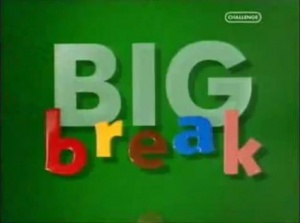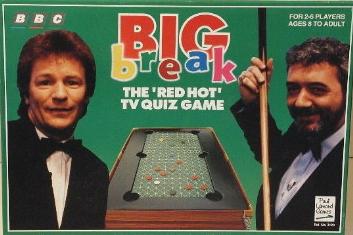Big Break
(→Web links) |
(→Trivia) |
||
| Line 100: | Line 100: | ||
== Trivia == | == Trivia == | ||
| - | Even though it says at the top of the article "14 series", there were actually 10 series made. That's because the 1995, 1996, 1997, 1998 and 2001 | + | Even though it says at the top of the article "14 series", there were actually 10 series made. That's because the 1995, 1996, 1997, 1998 and 2001 series (No series was made in 1999 and 2000) were actually split into 9 series and later episodes had to wait 2 to 3 years to air because of how big the batch of episodes later series had. To avoid any confusion, here's a transmission guide to show you how the 5 series were actually spliced into 9 series. |
===1995=== | ===1995=== | ||
Revision as of 20:30, 30 October 2016
Contents |
Host
Mike Reid (non-broadcast pilot)
Co-hosts
John Virgo
Announcers:
Colin Ward Lewis (1991-8)
Zora Suleman (1998-9)
Charles Nove (1999-2002)
Broadcast
BBC1, 30 April 1991 to 9 October 2002 (222 episodes in 14 series + 17 specials)
as Stars of the Future: 27 May 1995 to 11 December 1999 (18 episodes in 4 series)
Synopsis
Long-running vehicle for blue-comedian-turned-good Jim Davidson to lark about and make silly voices.
Hot to pot
Host Jim Davidson, a UK stand-up comedian by trade, guides three teams through the rounds. Each team is made up of a contestant and a professional snooker player. In the first round, Red Hot, the contestants answer three rather easy questions in order to win time for their snooker playing partner who then has to "pot as many balls as they can" of the ten reds available on the table. The team who scores the least in terms of potted balls leaves the game.
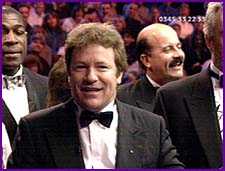 Host Jim Davidson, here attending a charity TV event.
Host Jim Davidson, here attending a charity TV event.At this point in the show, the leaving contestant gets the chance to perform a trick shot. Set-up by co-presenter and professional snooker player John Virgo, these stunts took a life of their own and a few (mostly awful) shows with purely trick shots were to appear in later years. The contestant would win a consolation prize, in later years usually consisting of a "No Dad" waistcoat (called that by Davidson, as in "No Dad, don't make me wear that")
Pocketing profits
The cleverest round, Pocket Money, involved the skills of the contestant and snooker player rather more. The snooker player would try to make a continuous break, scoring ten times the normal snooker value in pounds (so a potted 7-point black earned 70 pounds). When the player did not pot a ball, or committed a foul, the contestant would have to answer a question. Each ball colour related to a particular category of question (yellow was The Past and so on).
The pockets on the table were coloured with the six snooker colours. If a coloured ball happened to be potted into the correct corresponding pocket, its normal money value would be doubled. For example, the pink usually earned £60 but if it was potted into the pink (top right-hand corner) pocket, it would earn £120. Virgo would often shout out e.g. "Double pink!" to alert players to the possibility of doubling their money.
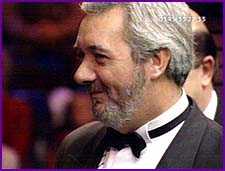 Referee (and butt of Davidson's jokes), John Virgo.
Referee (and butt of Davidson's jokes), John Virgo.Make or Break
The player earning the most money at this point went on to play Make or Break. The contestant answering up to five questions correctly allowed the snooker player to remove up to five red balls from a six-ball pack of reds. The snooker player would then have the remainder of the 90 seconds (whatever the contestant had not used in the question and answer section) to pot the balls that remained. The normal snooker rules applied, so after potting a red the player had to go for a colour before attempting to pot the coloured balls in sequence.
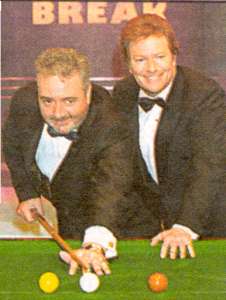 John and Jim cue up for a quick frame
John and Jim cue up for a quick frameThe best thing about this final round was that the results were often very varied. Sometimes the pro would make a really good start and then spend the last 30 seconds trying to get one ball in. Sometimes the player would be able to win the star prize even though there were three reds still to pot before going on to the coloured balls.
A spin-off series, Big Break: Stars of The Future, featured teenage players and contestants with virtually the same rules (a bit more time here and there, and the kids only keep 10% of their winnings because the rest goes to their school).
Game over
The show ended around the same time Davidson's other show, The Generation Game, did. Perhaps the show was running out of legs, maybe indicating why the BBC tried out Full Swing in 1996, a golf show in the same vein as Big Break and produced by the same John Burrowes. Although Full Swing wasn't recommissioned, nevertheless Big Break was one of the most popular shows that the BBC had done in the 90s.
Key moments
World Snooker Champion Stephen Hendry scoring not terribly many reds in Round 1.
Jim Davidson's cruel impressions of various snooker players, including Terry Griffiths, Dennis Taylor and Ray Reardon. Mind you, Virgo used to do the same in the past - but probably more affectionately.
Virgo's "it's foolproof" trick shots - oh, and his lively waistcoats as well.
Outtake: Davidson's arrival as Peter Pan on a flying wire in a Christmas special, only to promptly crash into the Christmas tree.
John Virgo taking part in the show himself (with Dennis Taylor as referee). After what Virgo described as 'the worst break I have ever seen', he managed to score just 2 in the first round (with the Mission: Impossible music playing over the footage). He then returned to his normal role for the rest of the show.
Catchphrases
"Pot as many balls as you can"
"We ask you to make your break".
"The time will start the next time you strike the cueball".
"Hit it quick!"
Davidson and Virgo used to sign off each show with, respectively: "Say goodnight, JV!" - "Goodnight, JV!"
Inventor
Though credited to Terry Mardell and Mike Kemp by the BBC at the time, a court case in 1998 found that they had effectively stolen the idea from minicab driver Roger Medcalf. The Birmingham Post newspaper reported that the courts awarded Mr Medcalf £100,000 in damages and a one-third share in income generated by the format.
Theme music
The theme music is The Snooker Song, composed by "Mr. Wombles" Mike Batt. It is sung by 1980s pop sensation Captain Sensible. It was originally written for Batt's musical The Hunting of the Snark in which Captain Sensible played the role of the Billiard Marker. Mike Batt also did the theme for Germany's biggest gameshow Wetten Dass...?, dontchaknow.
Trivia
Even though it says at the top of the article "14 series", there were actually 10 series made. That's because the 1995, 1996, 1997, 1998 and 2001 series (No series was made in 1999 and 2000) were actually split into 9 series and later episodes had to wait 2 to 3 years to air because of how big the batch of episodes later series had. To avoid any confusion, here's a transmission guide to show you how the 5 series were actually spliced into 9 series.
1995
- Series 6: 2 September 1995 to 19 July 1996 (27 episodes)
- Series 6: 2 September to 14 October 1995 (7 episodes)
- Series 7: 2 March to 19 July 1996 (20 episodes)
1996
- Series 7: 3 January 1997 to 6 March 1998 (29 episodes)
- Series 8: 3 January to 18 April 1997 (15 episodes)
- Series 9: 9 June to 14 July 1997 (5 episodes)
- Series 10: 9 January to 6 March 1998 (9 episodes)
1997
- Series 8: 4 April 1998 to 26 June 1999 (26 episodes)
- Series 11: 4 April to 18 July 1998 (11 episodes)
- Series 12: 13 February to 26 June 1999 (15 episodes)
1998
- Series 9: 4 December 1999 to 19 May 2001 (28 episodes)
- Series 13: 4 December 1999 to 19 May 2001 (28 episodes)
2001
- Series 10: 16 June 2001 to 9 October 2002 (18 episodes)
- Series 14: 16 June 2001 to 9 October 2002 (18 episodes)
Merchandise
Unseen Big Break (VHS)
Web links
BBC programme page, which includes a 1998 episode as part of a game show collection.

